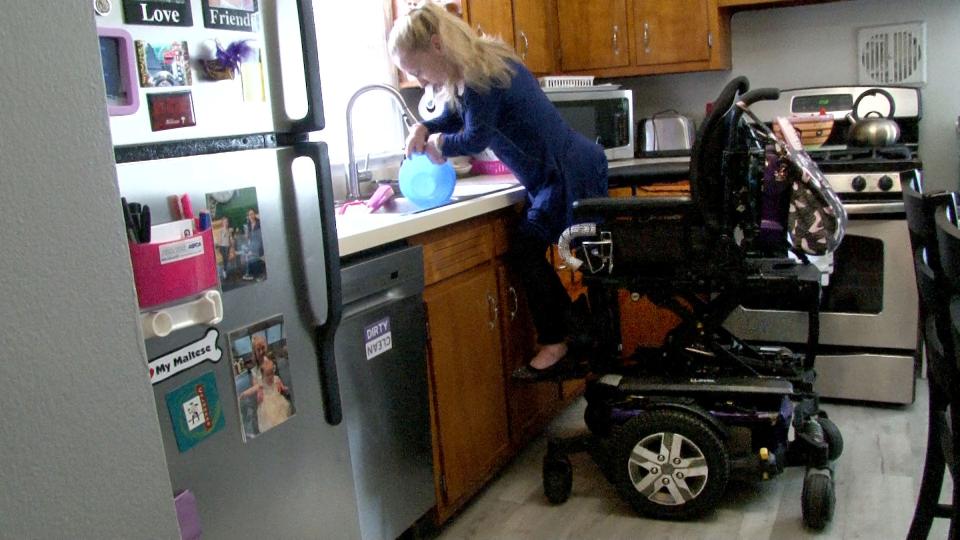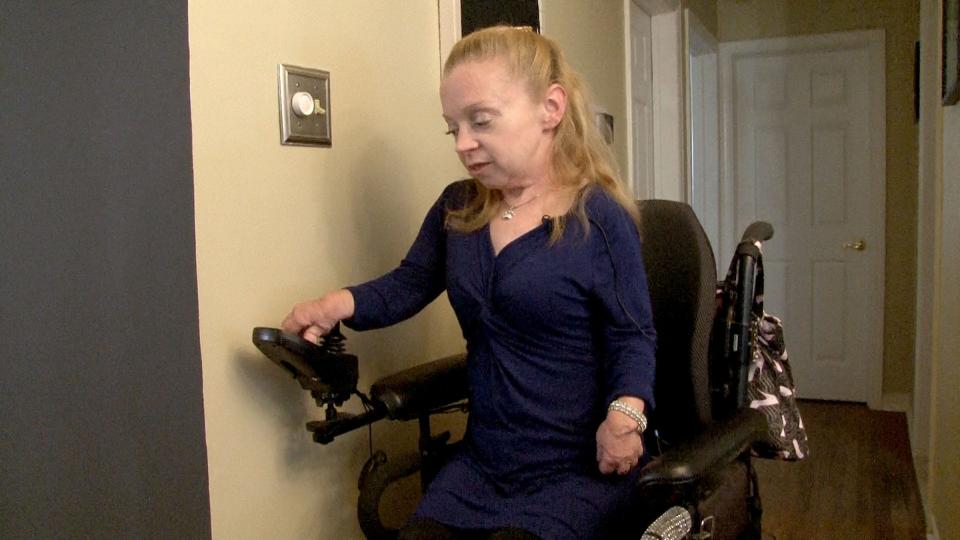Wheelchair users in NJ seek relief from red tape as repairs are delayed for months
For three months last year, Kelly Boyd had to make do without the wheelchair that has become synonymous with her freedom.
The 43-year-old from Hamilton has rheumatoid arthritis and has been using a wheelchair since she was 9. Her current chair has a motorized lift that raises her seat, allowing her to reach plates and glasses in her cupboard, talk face-to-face at ticket windows and pluck items from store shelves.
Yet when a leg rest and joystick on her chair needed work, she encountered what many wheelchair users have been suffering with, especially since the start of the COVID pandemic: A shortage of parts and technicians and a maze of insurance company regulations now mean big delays even for simple repairs.

“I don't know how they determine what's an emergency and what's not because in my opinion, anybody who relies on a wheelchair that doesn't work is in an emergency situation," Boyd said. "These companies don't realize these wheelchairs are our legs.”
Repairs, which typically must be done by a chair's manufacturer, now involve a four-month waiting period on average, according to Vincent Barba, chief medical officer at Somerset County-based Matheny Medical and Educational Center. The center houses one of just four wheelchair repair clinics in New Jersey.
That's a 50% increase over pre-pandemic levels, said Barba. The wait for a new wheelchair is even longer, he added.
In the past, acquiring a new chair, from a fitting in the clinic to delivery of the final product, usually took less than eight months. “Now, for us, it's out there eight to 12 months,” Barba said.
Wheelchair users who can afford it keep backups on hand for situations like these. But those are often more rudimentary or outdated models that lack necessary features like Boyd’s chair lift.
Without her main chair, “I could not reach my kitchen sink or the thermostat. I had to install a smart thermostat so I could adjust the heat and air," she recalled. "I could not reach the clothes hanging in my closet... I needed to ask for help more often.”
The crisis is the result of a number of factors that have come to a head in recent years, said Alexandra Bennewith, a vice-president with the United Spinal Association, which advocates for the nation's 5.5 million wheelchair users.

First, large wheelchair manufacturers have consolidated, leaving fewer qualified technicians to repair the equipment. Modern wheelchairs often have complex electrical and mechanical components and are customized to a users specific needs and body. They're far more complicated than the metal folding models with vinyl seats people are used to seeing in hospital hallways.
Bureaucracy has added to the problem. Insurers, including the government Medicare and Medicaid programs, require prior authorizations for even basic repairs, Barba said.
In recent years, users have also faced a parts shortage that was exacerbated by supply-chain bottlenecks during the pandemic, he added.
Edison’s Javier Robles, 56, a Rutgers professor who uses a $14,000 wheelchair, recently faced long delays for a motor to be fixed.
“One time I waited five months for my chair to be fixed,” Robles said. “I couldn't go to work. I've had to just stay home and wasn’t able to teach.’”
Permobil Americas, one of the larger wheelchair manufacturers, said parts delays have eased as the pandemic has receded.
Still, “the global supply chain crisis, particularly the microchip shortage was a challenging time for everyone,” said Audra Watt, the company’s vice president of marketing.
Rutgers: University launches disability studies minor to explore world of oft-ignored community
While some, like Boyd and Robles, are appealing directly to manufacturers for help, others are looking to lawmakers for relief. Legislation in several states around the country, though not New Jersey, aims to streamline the repair process.
One such proposed solution is to provide routine maintenance coverage for wheelchairs. If insurers reimbursed owners for maintenance costs, the thinking goes, fewer problems might develop. Advocates also say people should be able to repair their own equipment when it comes to easy fixes like replacing tubes for flat tires.
One idea that manufacturers, repair clinics, advocates and wheelchair users all support is lifting requirements for prior authorizations. Medicare currently requires prescriptions when submitting new claims for reimbursement.
“If Medicaid had an expedited process whereby we could get a review of our needs to repair a chair for someone that would be very helpful," Barba said. "Right now the process that we have to go through is quite cumbersome, even for urgent safety repairs."
The Centers for Medicare & Medicaid Services didn't respond to a question about streamlining its process. In a statement, the agency said there "currently are no specific standards regarding timelines for wheelchair repairs" but also noted that is has issued quality standards that "address timeliness of furnishing items and services."
"Under the supplier product-specific service requirements, the supplier must provide, or arrange for, loaner equipment equivalent to the original equipment during any repair period," it stated. Third-party accreditation groups "investigate instances brought to their attention where suppliers may be in violation of the quality standards and can act as necessary to remedy any problems they encounter."

Boyd said she's never been offered a loaner chair without asking for one. She tried it once and the experience wasn't a good one, she added. "It was not the right size," she said, and the seat did not elevate.
CMS encourages wheelchair users who have concerns "to call the supplier that provided them the item or locate a Medicare-enrolled supplier by calling 1-800-Medicare or using the Medicare Supplier Directory at medicare.gov/supplier."
Gene Myers covers disability and mental health for NorthJersey.com and the USA TODAY Network. For unlimited access to the most important news from your local community, please subscribe or activate your digital account today.
Email: myers@northjersey.comTwitter: @myersgene
This article originally appeared on NorthJersey.com: Wheelchair users in NJ seek help with repairs delayed for months

